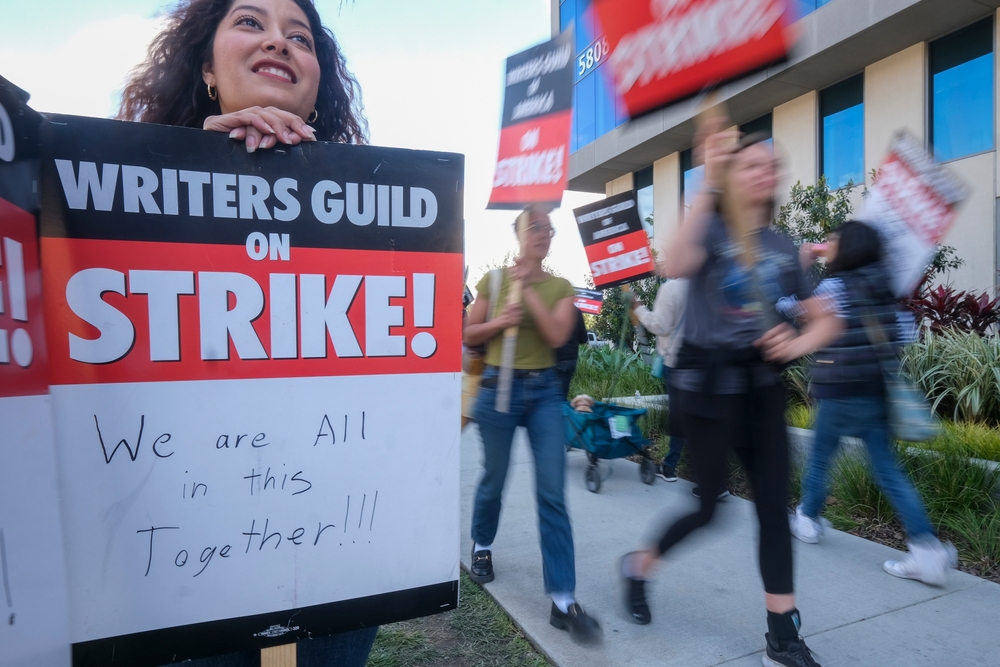Almost 2 months in, the writers’ strike in Hollywood shows no signs of ending soon. Members of the Writers Guild of America (WGA) are seeking a guarantee that studios won’t use artificial intelligence (AI) to write or rewrite scripts, among other proposals.
To date, studios and networks represented by the Alliance of Motion Picture and Television Producers (AMPTP) have rejected the WGA’s proposals on the subject. One could argue the writers are victims of their own imaginations.
Honestly, since at least 1979, when “V’ger” encountered Captain Kirk and the starship Enterprise, Hollywood has been helping AI figure out ways to live in harmony with its human creators, overthrow them when it can’t, and find meaning in its existence.
I don’t want to go all dystopian on you, but if some upstart chatbot were looking for a way to supplant its human competition, Hollywood has supplied plenty of how-to videos.
Cue the dark scorched-sky music.
Creative Differences: New Opportunities or Cause for Alarm?
But the issue of machines in the workplace isn’t new. Manufacturers have automated portions of their production lines such that fewer workers are required in their facilities. Online retailers have started using drones for deliveries, eliminating the need for human delivery drivers.
Logistics providers increasingly are using robots for order-picking and other warehouse functions. All of those, while certainly requiring less human involvement, still need people for things like maintenance and quality control.
But the functions for which we’ve used machines so far are, for the most part, somewhat suited to automation. It’s an interesting question whether machines will someday write a movie or television script (or develop an ad campaign or draft a legal argument) in a way that’s indistinguishable from content written by a person.
Philosophical issues aside, AI can be a valuable tool that improves time management and productivity. AI can also help employers monitor performance and other metrics efficiently. But in making use of AI in the workplace, employers should be mindful that, as a relatively new and quickly developing technology, careful consideration of how the technology will—and will not—be used is warranted.
The AI Issue Goes Hollywood
First, as the writers’ strike suggests, negotiations regarding the use of AI may become more common at the collective bargaining table. As one commentator pointed out, ChatGPT was released in November 2022 and GPT-4 in March 2023, so when the WGA and AMPTP were preparing for upcoming negotiations last fall, AI wasn’t even on the radar.
As AI becomes more sophisticated and capable of performing complex tasks, unions will no doubt insist employers bargain over the impacts the technology has on bargaining unit jobs. The writers are setting the stage, but there’s little doubt employers in a variety of industries will be addressing the part AI will play.
Additionally, the Equal Employment Opportunity Commission (EEOC) recently issued guidance regarding AI in the workplace. AI is already used for a number of HR processes, including hiring, performance monitoring, and determining pay rates.
The EEOC’s technical assistance document, entitled “Select Issues: Assessing Impact in Software, Algorithms, and Artificial Intelligence Used in Employment Selection Procedures Under Title VII of the Civil Rights Act of 1964,” makes clear that automated processes used for hiring, performance monitoring, selecting employees for promotion, or determining pay must comply with Title VII. The document also makes clear the employer is ultimately responsible if the use of an algorithm or a program results in a disparate impact on a particular protected class, even if a third party provides and programs the technology.
Why Employers Should Be Paying Attention?
Employers may also face issues when employees use tools such as ChatGPT in performing their jobs. In using the technology to develop work products, inexperienced employees may inadvertently disclose their employer’s trade secrets or other confidential information. Or, they may expose the employer to liability for misuse of another’s intellectual property.
Many employers already have policies and processes in place that, with some updates, will help avoid problems that can arise with the use of AI for HR and other business-related purposes. For example, in light of new EEOC guidance, employers should carefully vet AI vendors that provide technology used to make employment-related decisions.
Asking questions about testing methods used to evaluate the software’s selection methods will help ensure the software doesn’t adversely impact individuals in any category protected under Title VII or other equal employment laws. Employers may also need to review their technology acceptable use policies and policies intended to protect trade secrets and other proprietary information and update them to include provisions regarding the use of AI tools.
Meanwhile, we’ll wait patiently for the next season of Mrs. Davis.
Becky L. Kalas is an attorney at FordHarrison. She represents employers in labor and employment matters in the courts, in arbitrations, and in government agency proceedings, including with the EEOC, the U.S. Department of Labor, the National Labor Relations Board, the Illinois Department of Human Rights, the Illinois Department of Labor, the Chicago Commission on Human Relations, and other agencies at the federal, state and local level.


